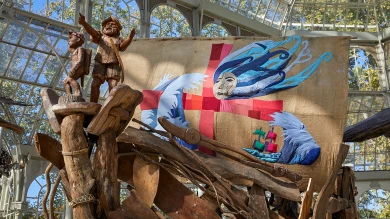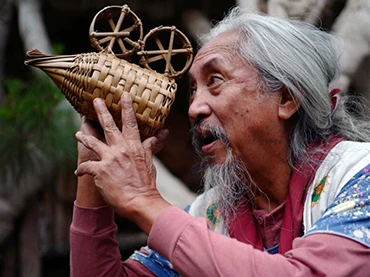-
Thursday, 10 February 2022 – 6pm / Second session: Thursday, 24 February 2022 – 6pm Sabatini Building, Auditorium
Kidlat Tahimik. Mababangong Bangungot (Perfumed Nightmare)
Philippines, 1977, colour, original version in English with Spanish subtitles, 16mm transferred to DA, 91’. Restored version
Tickets—With a presentation by Chema González, head of the Museo Reina Sofía’s Cultural and Audiovisual activities, in the first session, and by curator and film programmer Juan Guardiola in the second.
“I am Kidlat Tahimik and I choose my vehicle” are the words that introduce a young film-maker and the leading actor in this debut feature film, a cult classic, as he crosses a bridge — a metaphor for modernisation — pulling a toy car. Tahimik drives jeepneys, army jeeps converted into buses and customised with popular motifs and gaudy colours, which travel the route, the bridge, between the countryside and the big city. He is obsessed with Wernher von Braun, the aerospace engineer who built the rocket that took the United States to the moon, and dreams longingly of the West. After a summit of world leaders wearing safari suits in the Philippine jungle, the protagonist is invited to go to Paris, where he will see, first-hand, this yearned-for modernisation: “bridges, bridges everywhere!”. However, he also comes across its contradictions, or perfumed nightmares: cities obliterated by mega-structures, such as the Centre Pompidou under construction, filmed by Tahimik as if it were a large supermarket, and excessive ambition (“if small chimneys work, why the big ones? If small planes work, why the flying super machines?”). In short, this film is a vivid succession of gags that pass from being seduced by the West to relinquishing it.
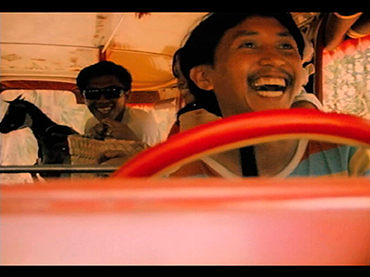
-
Friday, 11 February 2022 – 6pm / Second session: Friday, 25 February 2022 – 6pm Sabatini Building, Auditorium
Kidlat Tahimik. Sinong Lumikha ng Yoyo? Sinong Lumikha ng Moon Buggy? (Who Invented the Yo-yo? Who Invented the Moon Buggy?)
Philippines, 1979, colour, original version in English with Spanish subtitles, 16mm transferred to DA, 95’. Restored version
Tickets—With a presentation by Sabrina Boutselis, a Filipino-North American art historian, in the first session.
Few people have ever wondered what the yo-yo and moon buggy have in common: both are Filipino inventions. The first, a hunting tool invented by Malayan indigenous people in the sixteenth century; the second, a version of the jeepney Filipino engineer Eduardo San Juan put forward to NASA. Fewer still have wondered, as the protagonist does in this parody of the aerospace Cold War, if it’s possible to yo-yo on the moon. Will it go down, up, or stay still? With this target and the visionary help of a group of children, the protagonist founds the Philippine Official Moon Project (POMP), which will send an “underdeveloped” person to the moon for the first time. The rocket draws inspiration from the bell towers of colonial churches in the Philippines, with its energy source coming from boiling onion and its thrust from the first woman, not man, to walk on the moon: the Virgin Mary, as revealed in the iconography of the Immaculate Conception. The film, as the credits proclaim, “is a third-world space spectacle”.
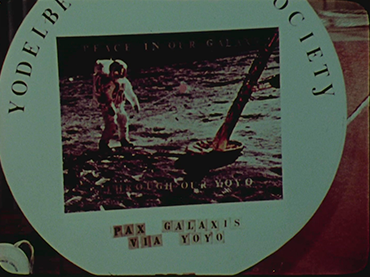
-
Saturday, 12 February 2022 – 6pm / Second session: Saturday, 26 February 2022 – 6pm Sabatini Building, Auditorium
Werner Herzog. The Enigma Gaspar Hauser
Germany, 1974, colour, original version in German with Spanish subtitles, BR, 110’. Courtesy of the Werner Herzog Office
Tickets—With the presentation of Pablo Maqueda, filmmaker, author of Dear Werner. Walking on the cinema (2020), in the second session
A historical drama by late-Romantic and irrationalist film-maker Werner Herzog, a close friend of Kidlat Tahimik’s and the person who encouraged him to take the leap into directing. The film is the nineteenth-century tale of a wild boy, a young adolescent held prisoner for years due to his controversial noble origins (according to speculation) and unable to speak, write and eat anything other than bread and water. A reflection on the extreme violence of social norms and the purest innocence of the misfit, Herzog’s film also sees Tahimik play a key role: an indigenous man paraded as an attraction in a human zoo — Kaspar Hauser’s equal in otherness and kidnapped over his exoticism, doomed to be repeated by conventional society. This performance would impel the examination of the Western colonial apparatus that runs through Kidlat Tahimik’s oeuvre.
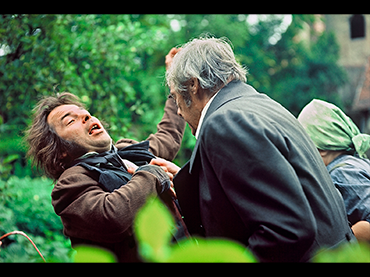
-
Wednesday, 16 February 2022 – 6pm / Second session: Wednesday, 2 March 2022 – 6pm Sabatini Building, Auditorium
Kidlat Tahimik. Turumba
Philippines, 1981, colour, original version in Tagalog with Spanish subtitles, 16mm transferred to DA, 96’. Restored version
Tickets—With a presentation by Anna de Guia Eriksson, Philippine film-maker and programmer, in the first session, and a conversation between Kidlat Tahimik and Chema González in the second.
Half ethnographic documentary, half anti-capitalist fable, Turumba is the story of a village and how its traditional rituals transform through the appearance of a factory and standardised production. The village of Pakil (Philippines) holds the procession of the Lady of Sorrows as villagers dress in all their splendour for the occasion. A local sculptor and his son sell papier-mâché dogs in the street and a German tourist, associated with department stores in Munich, appears and buys them all up and commissions a large shipment. As a result, the family business becomes a large factory of child labour and, from one day to the next, the ritual time of procession is replaced by the accelerated and standardised rhythm of the factory. When a truck arrives to cart away the dogs, the child-workers wave unreservedly. The narrator’s voice concludes with the phrase: “we don’t know if the children are waving at the truck or at the devil because it’s finally leaving”.
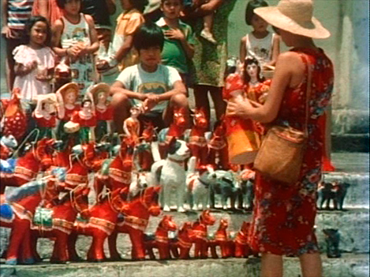
-
Thursday, 17 February 2022 – 6pm / Second session: Thursday, 3 March 2022 – 6pm Sabatini Building, Auditorium
Kidlat Tahimik and Kidlat Gottlieb Kalayaan. Bakit Dilaw Ang Kulay ng Bahaghari? (Why Is Yellow at the Middle of the Rainbow?)
Philippines, 1981–1991, colour, original version in English and Tagalog with Spanish subtitles, 174’
Tickets—With a presentation by Kidlat Tahimik and Kidlat Gottlieb Kalayaan in the second session.
A wondrous film on contemporary Philippine history stretching across a vast compendium of ten years seen through the eyes of a child, Kidlat Gottlieb, the film-maker’s son, and an amusing and educational chat with his father. This film collage is key to understanding the Philippines today, and its influence radiates towards other decisive pictures in recent Philippine film, for instance Lav Diaz’s Evolution of a Filipino Family (2004). The film is articulated between the intimacy of the father-son relationship and the public relevance of the events it portrays, two aspects that bestow this historical epic with a personal and poetic quality. The film is split into three parts and an epilogue: I Am Frivolous Green, 1981–1983 narrates the journeys of an international film-maker through North American counterculture, with Dennis Hopper and Francis Ford Coppola, while it reflects on the third world, Ferdinand Marcos’s dictatorship and the assassination of Benigno Aquino; I Am Furious Yellow, 1983–1986 documents the yellow-coloured social tides against the dictatorship, up until the electoral triumph of Corey Aquino, reflecting on what it means to be Filipino; I Am Curious Pink, 1986–1989 revolves around the way of life of indigenous peoples in the Cordillera Administrative Region (RAC), nuclear disarmament, paramilitary groups and art movements rooted in a desire for peace; and, finally, We Are Disastrous Gray 1989–1991, which centres on the legacy of North American occupation and on efforts, real and symbolic, to rebuild the Philippines after an earthquake.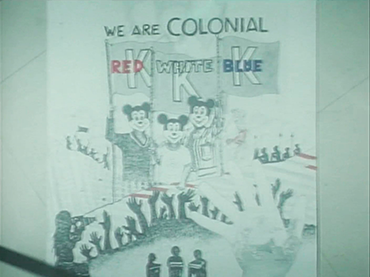
-
Friday, 18 February 2022 – 6pm / Second session: Friday, 4 March 2022 – 6pm Sabatini Building, Auditorium
Carte Blanche: José Rizal
TicketsSally Gutiérrez. Camino RizalSpain, 2021, colour, original version in Spanish and English with Spanish subtitles, DA, 25’Marilou Diaz-Abaya. José RizalPhilippines, 1998, colour, original version in Tagalog with Spanish subtitles, DA, 165’—With a presentation by José Manuel Bueso Fernández, co-writer of Camino Rizal, and Kidlat Tahimik in the second.
Invited to programme a session in this film series, Kidlat Tahimik has selected two pieces on José Rizal (Philippines, 1861–1896), a man of letters, doctor and politician and author of the novels in Spanish Noli me tángere (1887) and El filibusterismo (1891). A leader of Philippine independence and educated in Madrid, he was executed at just 35 years of age in Manila by Spain’s colonial government. Camino Rizal is a documentary essay and a medium-length film that spotlights the tour by Philippine artist and performer Carlos Celdrán (1972–2019) in Madrid on the life of José Rizal and which, with the collaboration of artists and members of the Philippine community in Spain, brings the debates started by Rizal into the present. The second film is a Filipino fictional blockbuster which narrates the life of Rizal as a figure of vicissitudes, trapped between a yearning for modernisation and the need for emancipation from colonial power. As with Enrique de Malaca (1495–1521), the Philippine slave of Fernando de Magallanes, José Rizal is a source of fascination for Tahimik, his thought hovering over many of the film-maker’s reflections.
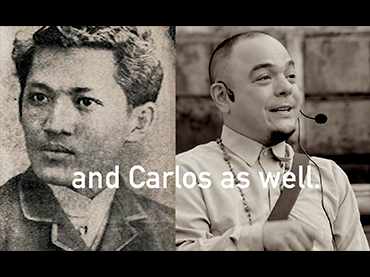
-
Saturday, 19 February 2022 – 6pm / Second session: Saturday, 5 March 2022 – 6pm Sabatini Building, Auditorium
Kidlat Tahimik. Balikbayan #1 Memories of Overdevelopment Redux VI
Philippines, 1979–2015, colour and b/w, original version in Tagalog and English with Spanish subtitles, DA, 159’
Tickets—With a presentation and performance by Kidlat Tahimik in the second session.
This is a film that has been re-edited repeatedly, a work in progress developed across different decades. It narrates the story of Enrique de Malaca (1495–1521), the Malayan slave and interpreter of Fernando de Magallanes who, according to different historical interpretations, could have been the first person to circumnavigate the globe, upon returning, in 1521, to the Philippine archipelago (his birthplace), before Juan Sebastián Elcano returned to Spain in 1522. Balikbayan is also a Tagalog term for foreign “guest worker”, a bureaucratic situation which has also affected Tahimik and makes him identify with the Filipino migrant community. Enrique de Malaca, therefore, constitutes the first balikbayan. The film-maker develops the idea that Enrique de Malaca, after being granted freedom by Magallanes, became a sculptor and made similar sculptures to the ones that populate Tahimik’s exhibition organised by the Museo Reina Sofía in the Palacio de Cristal. Ultimately, the film is an exploration of the epic Western narrations on “conquest” and “discovery” from the point of view of the other.
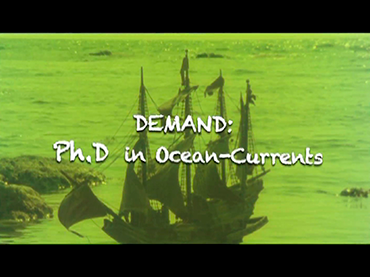
![Kidlat Tahimik. Sinong Lumikha ng Yoyo? Sinong Lumikha ng Moon Buggy? [¿Quién inventó el yoyó? ¿Quién inventó el vehículo lunar?]. Película, 1978](https://recursos.museoreinasofia.es/styles/large_landscape/public/Actividades/1_snippet_0.png.webp)
Kidlat Tahimik. Sinong Lumikha ng Yoyo? Sinong Lumikha ng Moon Buggy? (Who Invented the Yo-yo? Who Invented the Moon Buggy?). Film, 1978
Held on 10 Feb 2022
The Museo Reina Sofía organises a film series centred around Philippine film-maker Kidlat Tahimik (Baguio, Philippines, 1942) to coincide with the exhibition Kidlat Tahimik. Magellan, Marilyn, Mickey & Fr. Dámaso. 500 Years of Conquistador RockStars (Palacio de Cristal, 29 October 2021 – 6 March 2022). The programme includes five of Tahimik’s feature-length films and a “carte blanche” session for the director, as well as Werner Herzog’s film The Enigma of Kaspar Hauser (1974), Tahimik’s first appearance in film as an actor. Further, the series features debates and in-person conversations with the film-maker and his son, collaborator and leading actor, Kidlat de Guia.
Born Eric Oteyza de Guia, Kidlat Tahimik, which means “silent lightning” in Tagalog, is a linchpin of recent Philippine avant-garde film-making. Among Filipino directors of international distinction such as Khavn de la Cruz, Brillante Mendoza and Lav Diaz, he is regarded as an indisputable master of Philippine film, with his filmography also denoting the end of Third Cinema, the film movement from third-world countries that was prevalent in the 1960s and 1970s and championed “imperfect” film-making, as Cuban director Julio García Espinosa defined it, with scant resources and as a weapon of combat and emancipation from the first-world film industry and ideology. The themes of Third Cinema — inequality, the tyranny of progress and cultural and political imperialism — are also at the forefront of Tahimik’s work, yet rather than being treated in the black-and-white vein of exploited versus exploiter they are an intrinsic part of the third-world experience and life. Thus, Tahimik is one of the first film-makers to understand globalisation as a phenomenon in which these different worlds or states of development co-exist inside the same country, and to relate it to the desires and aspirations of subjects, just like the film-maker himself, who can move between the technological dream of a journey to the moon and the search for indigenous authenticity.
Kidlat Tahimik’s film-making decries forced growth and development and the cultural and social homogenisation this model implies, whilst innovatively steering clear of the social realism and factual documentary that prevailed around these issues during the 1970s, the period in which Tahimik produced his pivotal features. The film-maker overhauls the comedy genre by revamping the figure of the clown in cinema, from Charles Chaplin to Jacques Tati, a clown he plays and that experiences the contradictions of globalisation and continues to interrogate and investigate, with those accompanying him, other forms of living in the world. Because, when all is said and done, perhaps gullibility and absurdity are the best tools against developmentalism.
Curator
Chema González
Collaboration
![Kidlat Tahimik. Sinong Lumikha ng Yoyo? Sinong Lumikha ng Moon Buggy? [¿Quién inventó el yoyó? ¿Quién inventó el vehículo lunar?]. Película, 1978](https://recursos.museoreinasofia.es/styles/large_landscape/public/Actividades/1_snippet_0.png.webp)
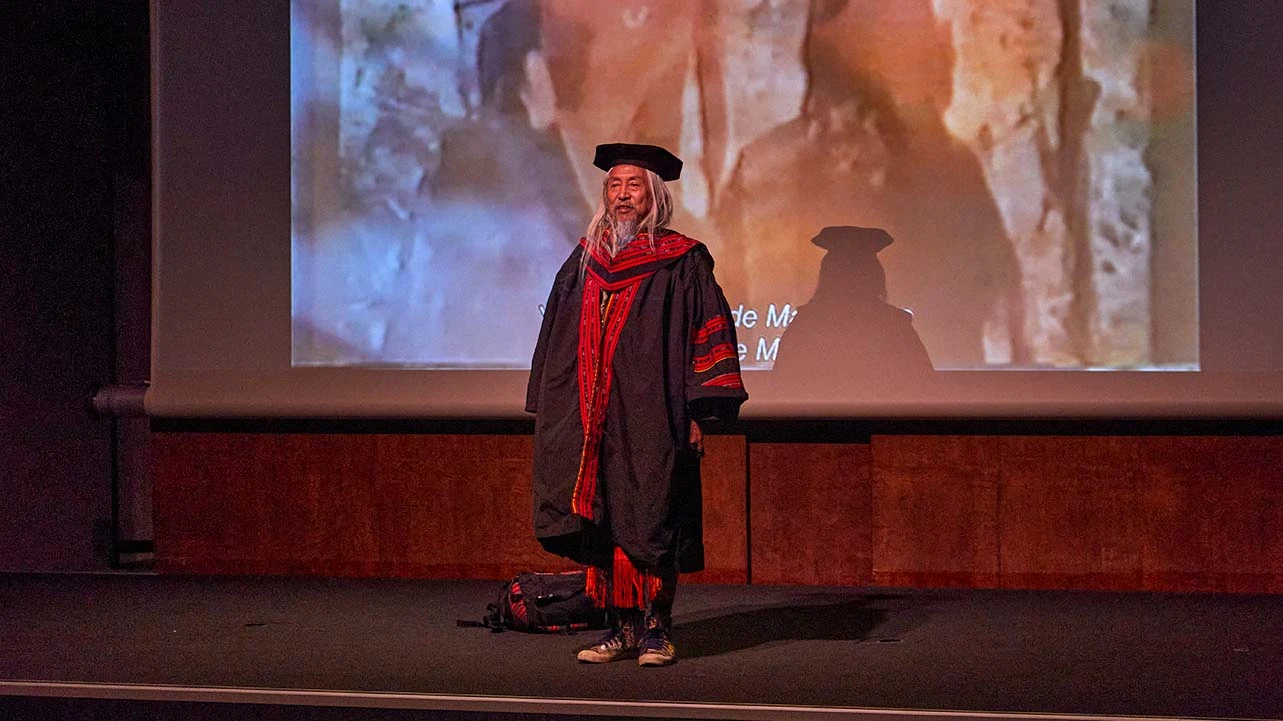
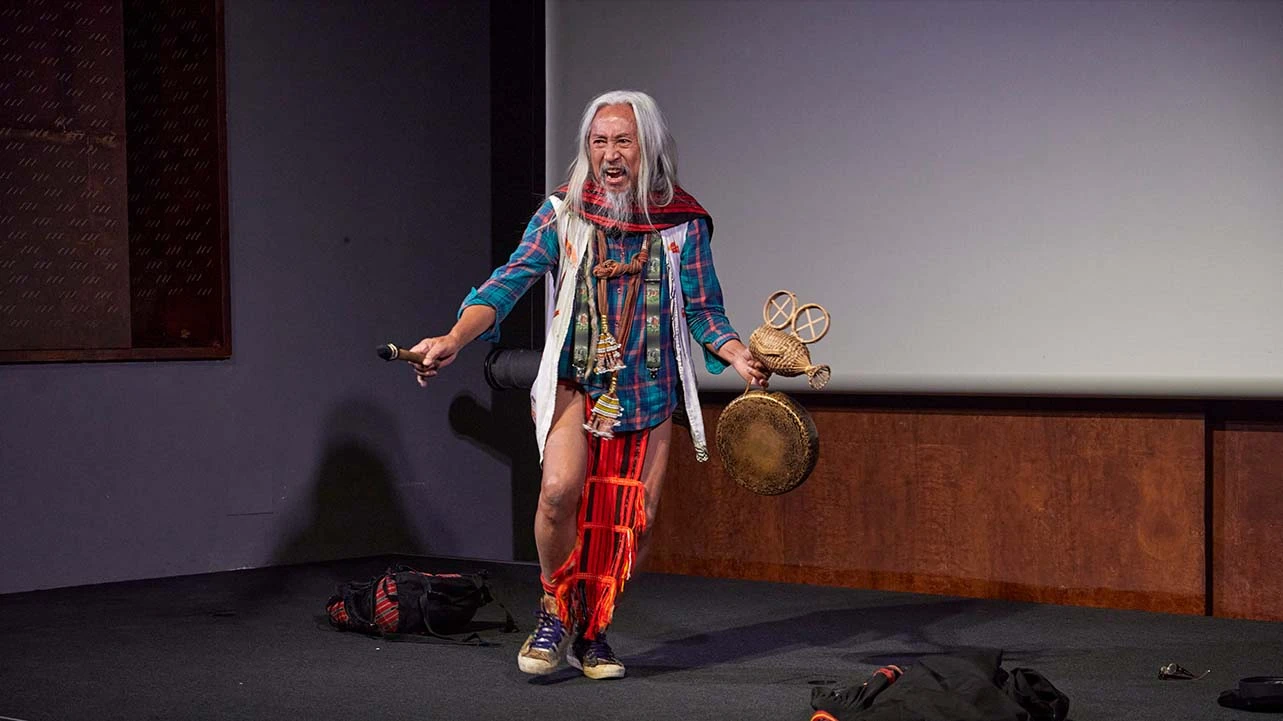
Más actividades

Difficulty. Forms and Political Effects of Deviation in Writing and Contemporary Art
23 February – 14 December 2026 – Check programme
Difficulty. Forms and Political Effects of Deviation in Writing and Contemporary Art is a study group aligned towards thinking about how certain contemporary artistic and cultural practices resist the referentiality that dominates the logics of production and the consumption of present-day art. At the centre of this proposal are the concepts of difficulty and deviation, under which it brings together any procedure capable of preventing artistic forms from being absorbed by a meaning that appears previous to and independent from its expression. By ensuring the perceptibility of their languages, difficulty invites us to think of meaning as the effect of a signifying tension; that is, as a productive and creative activity which, from the materiality of art objects, frees aesthetic experience from the representational mandate and those who participate in it from the passiveness associated with tasks of mimesis and decoding.
The economy of the referential norm translates the social logic of capitalism, where insidious forms of capturing subjectivity and meaning operate. In the early 1980s, and adopting a Marxist framework, poet Ron Silliman highlighted how this logic entailed separating language from any mark, gesture, script, form or syntax that might link it to the conditions of its production, rendering it fetichised (as if without a subject) and alienating its users in a use for which they are not responsible. This double dispossession encodes the political strategy of referential objectivity: with no subject and no trace of its own consistency, language is merely an object, that reality in which it disappears.
The political uses of referentiality, more sophisticated today than ever before, sustain the neoliberal-extractivist phase of capitalism that crosses through present-day societies politically, economically and aesthetically. Against them, fugitive artistic practices emerge which, drawing from Black and Queer studies and other subaltern critical positions, reject the objective limits of what exists, invent forms to name what lies outside what has already been named, and return to subjects the capacity to participate in processes of emission and interpretation.
Read from the standpoint of artistic work, the objective capture of referentiality may be called transparency. Viewed from a social contract that reproduces inequality in fixed identity positions, transparent in this objectivity are, precisely, the discourses that maintain the status quo of domination. Opposite the inferno of these discourses, this group aims to collectively explore, through deviant or fugitive works, the paradise of language that Monique Wittig encountered in the estranged practices of literature. For the political potency of difficulty — that is, its contribution to the utopia of a free language among equals — depends on making visible, first, its own deviations; from there, the norm that those deviations transgress; and finally, the narrowness of a norm which in no way exhausts the possibilities ofsaying, signifying, referring and producing a world.
From this denouncement of referential alienation, fetishisation and capture, Difficulty. Forms and Political Effects of Deviation in Writing and Contemporary Art turns its attention to the strategies of resistance deployed by contemporary artists and poets. Its interest is directed towards proposals as evidently difficult or evasive as those of Gertrude Stein, Lyn Hejinian, Theresa Hak Kyung Cha, Kameelah Janan Rasheed, Kathy Acker, María Salgado and Ricardo Carreira, and as seemingly simple as those of Fernanda Laguna, Felix Gonzalez Torres and Cecilia Vicuña, among other examples that can be added according to the desires and dynamics of the group.
The ten study group sessions, held between February and December, combine theoretical seminars, work with artworks from the Museo Reina Sofía’s Collections and exhibitions, reading workshops and public programs. All these formats serve as spaces of encounter to think commonly about certain problems of poetics — that is, certain political questions — of contemporary writing and art.
Difficulty. Forms and Political Effects of Deviation in Writing and Contemporary Art inaugurates the research line Goodbye, Representation, through which the Museo Reina Sofía’s Studies Directorship seeks to explore the emergence of contemporary artistic and cultural practices which move away from representation as a dominant aesthetic-political strategy and redirect their attention toward artistic languages that question the tendency to point, name and fix, advocating instead for fugitive aesthetics. Over its three-year duration, this research line materializes in study groups, seminars, screenings and other forms of public programming.

Institutional Decentralisation
Thursday, 21 May 2026 – 5:30pm
This series is organised by equipoMotor, a group of teenagers, young people and older people who have participated in the Museo Reina Sofía’s previous community education projects, and is structured around four themed blocks that pivot on the monstrous.
This fourth and final session centres on films that take the museum away from its axis and make it gaze from the edges. Pieces that work with that which is normally left out: peripheral territories, unpolished aesthetics, clumsy gestures full of intent. Instead of possessing an institutional lustre, here they are rough, precarious and strange in appearance, legitimate forms of making and showing culture. The idea is to think about what happens when central authority is displaced, when the ugly and the uncomfortable are not hidden, when they are recognised as part of the commons. Film that does not seek to be to one’s liking, but to open space and allow other ways of seeing and inhabiting the museum to enter stage.

Intergenerationality
Thursday, 9 April 2026 – 5:30pm
This series is organised by equipoMotor, a group of teenagers, young people and older people who have participated in the Museo Reina Sofía’s previous community education projects, and is structured around four themed blocks that pivot on the monstrous.
The third session gazes at film as a place from which to dismantle the idea of one sole history and one sole time. From a decolonial and queer perspective, it explores films which break the straight line of past-present-future, which mix memories, slow progress and leave space for rhythms which customarily make no room for official accounts. Here the images open cracks through which bodies, voices and affects appear, disrupting archive and questioning who narrates, and from where and for whom. The proposal is at once simple and ambitious: use film to imagine other modes of remembering, belonging and projecting futures we have not yet been able to live.

Remedios Zafra
Thursday March 19, 2026 - 19:00 h
The José Luis Brea Chair, dedicated to reflecting on the image and the epistemology of visuality in contemporary culture, opens its program with an inaugural lecture by essayist and thinker Remedios Zafra.
“That the contemporary antifeminist upsurge is constructed as an anti-intellectual drive is no coincidence; the two feed into one another. To advance a reactionary discourse that defends inequality, it is necessary to challenge gender studies and gender-equality policies, but also to devalue the very foundations of knowledge in which these have been most intensely developed over recent decades—while also undermining their institutional support: universities, art and research centers, and academic culture.
Feminism has been deeply linked to the affirmation of the most committed humanist thought. Periods of enlightenment and moments of transition toward more just social forms—sustained by education—have been when feminist demands have emerged most strongly. Awareness and achievements in equality increase when education plays a leading social role; thus, devaluing intellectual work also contributes to harming feminism, and vice versa, insofar as the bond between knowledge and feminism is not only conceptual and historical, but also intimate and political.
Today, antifeminism is used globally as the symbolic adhesive of far-right movements, in parallel with the devaluation of forms of knowledge emerging from the university and from science—mistreated by hoaxes and disinformation on social networks and through the spectacularization of life mediated by screens. These are consequences bound up with the primacy of a scopic value that for some time has been denigrating thought and positioning what is most seen as what is most valuable within the normalized mediation of technology. This inertia coexists with techno-libertarian proclamations that reactivate a patriarchy that uses the resentment of many men as a seductive and cohesive force to preserve and inflame privileges in the new world as techno-scenario.
This lecture will address this epochal context, delving into the synchronicity of these upsurges through an additional parallel between forms of patriarchal domination and techno-labor domination. A parallel in which feminism and intellectual work are both being harmed, while also sending signals that in both lie emancipatory responses to today’s reactionary turns and the neutralization of critique. This consonance would also speak to how the perverse patriarchal basis that turns women into sustainers of their own subordination finds its equivalent in the encouraged self-exploitation of cultural workers; in the legitimation of affective capital and symbolic capital as sufficient forms of payment; in the blurring of boundaries between life and work and in domestic isolation; or in the pressure to please and comply as an extended patriarchal form—today linked to the feigned enthusiasm of precarious workers, but also to technological adulation. In response to possible resistance and intellectual action, patriarchy has associated feminists with a future foretold as unhappy for them, equating “thought and consciousness” with unhappiness—where these have in fact been (and continue to be) levers of autonomy and emancipation.”
— Remedios Zafra

27th Contemporary Art Conservation Conference
Wednesday, 4, and Thursday, 5 March 2026
The 27th Contemporary Art Conservation Conference, organised by the Museo Reina Sofía’s Department of Conservation and Restoration, with the sponsorship of the Mapfre Foundation, is held on 4 and 5 March 2026. This international encounter sets out to share and debate experience and research, open new channels of study and reflect on conservation and the professional practice of restorers.
This edition will be held with in-person and online attendance formats, occurring simultaneously, via twenty-minute interventions followed by a five-minute Q&A.
